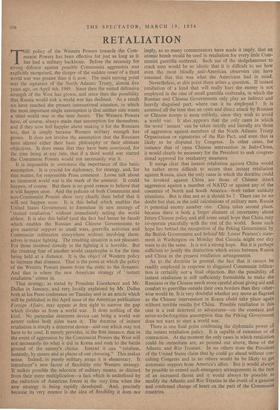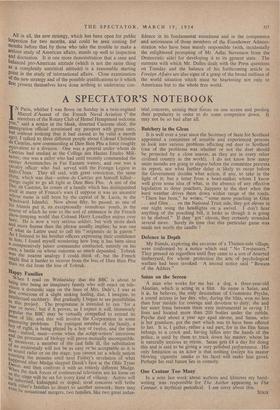RETALIATION
It is impossible to overstress the importance of this basic assumption. It is crucial for diplomacy, for strategy, and, for that matter, for responsible Press comment. Loose talk about an imminent world war is the mark of the amateur. It could happen, of course. But there is no good reason to believe that it will happen soon. And the policies of both Communist and non-Communist Powers show very clearly their belief that it will not happen soon. It is this belief which enables the United States Government to formulate its new strategy of ' instant retaliation' without immediately setting the world ablaze. It is also this belief (and the fact had better be faced) which enables the Russian and Chinese Governments to give material support to small wars, guerrilla activities and Communist infiltration everywhere without involving them- selves in major fighting. The resulting situation is not pleasant. For those involved directly in the fighting it is horrible. But the crushing fear of another world catastrophe is for the time being held at a distance. It is the object of Western policy to increase that distance. That is the point at which the policy of the Western Powers passes from the static to the dynamic. And that is where the new American strategy of ' instant retaliation ' comes in. imply, as so many commentators nave made it imply, that an atomic bomb would be used in retaliation for every little Com- munist guerrilla outbreak. Such use of the sledgehammer to crack nuts would be so idiotic that it is difficult to see how even the most blindly anti-American observers can have assumed that this was what the Americans had in mind.
Nevertheless, at this point there arises a question. If instant retaliation of a kind that will really hurt the enemy is not employed in the case of small guerrilla outbreaks, in which the Russian and Chinese Governments only play an indirect and heavily disguised part, where can it be employed ? It is assumed all the time that an open and direct attack by Russian or Chinese troops is 'mist unlikely, since they wish to avoid a world war. It also appears that the only cases in which the word ' instant' can be taken strictly and literally are those of aggression against members of the North Atlantic Treaty Organisation or signatories of the Rio Pact, and even that is likely to be disputed by Congress. In other cases, for instance that of open Chinese intervention in Indo-China, it would clearly be necessary for the President to seek congres- sional approval for retaliatory measures.
It seen-es clear that instant retaliation against China would be rather more difficult to secure than instant retaliation against Russia, since the only cases in which the doctrine could be invoked against China are those of Chinese direct aggression against a member of NATO or against any of the countries of North and South America—both rather unlikely situations. But is that not as it should be ? There can be no doubt but that, in the cold calculations of military men, Russia is potential enemy number one. China takes second place, because there is both a larger element of uncertainty about future Chinese policy and still some small hope that China may co-operate peacefully with the rest of the world. Some such hope lies behind the recognition of the Peking Government by the British Government and behind' Mr. Lester Pearson's state- ment in Washington on Monday that Canada might one day want to do the same. It is not a strong hope. But it is perhaps sufficient to justify the distinction which exists between Russia and China in the present retaliation arrangements.
As to the doctrine in general, the fact that it cannot be readily employed in response to disguised Communist infiltra- tion is certainly not- a final objection. But the possibility of instant retaliation is still sufficiently formidable to make the Russians or the Chinese much more careful about giving aid and comfort to guerrillas outside their own borders than they other- wise would be. It is very doubtful whether any move as flagrant as the Chinese intervention in Korea could take place again without terrible results for China. Possible retaliation in this case is a real deterrent to adventures—on the constant and never-to-be-forgotten assumption that the Peking Government does not want to start a world war.
There is one final point confirming the diplomatic power of the instant retaliation policy. It is capable of extension or of contraction. At the moment the only cases in which retaliation could be immediate are, as pointed out above, those of the Atlantic and Rio Treaties. In no others does the President of the United States claim that he could go ahead without con- sulting Congress and in no others would he be likely to get automatic support from America's allies. But it would always be possible to extend such emergency arrangements in, the face of an increased threat and it would always be possible to modify the Atlantic and Rio Treaties in the event of a genuine and confirmed change of heart on the part of the Communist countries. All in all, the new strategy, which has been open for public 418Pection for two months, and could be seen coming fot Months before that by those who take the trouble to make a serious study of American affairs, stands up well to inspection and discussion. It is one more demonstration that a sane and balanced pro-American attitude (which is not the same thing as a completely uncritical attitude) is a reasonable starting Point in the study of international affairs. Close examination of the new strategy and of the possible qualifications to it which flat present themselves have done nothing to undermine con- fidence in its fundamental soundness and in the competence and seriousness of those members of the Eisenhower Admini- stration who have been mainly responsible (with, incidentally the enlightened prompting of Mr. Adlai Stevenson from the Democratic side) for developing it to its present state. The sureness with which Mr. Dulles dealt with the Press questions on Tuesday and the balance of his forthcoming article in Foreign Affairs are also signs of a grasp of the broad outlines of the world situation which must be heartening not only to Americans but to the whole free world.



































 Previous page
Previous page